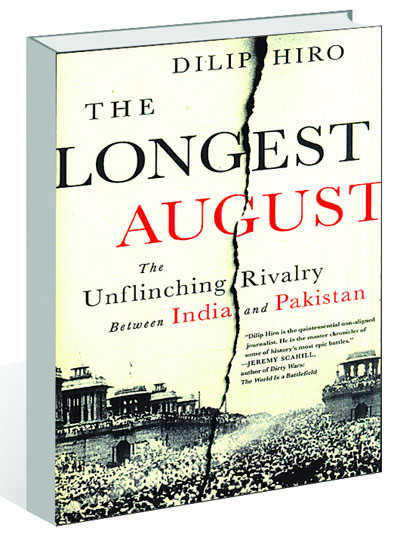
The Longest August: The Unflinching Rivalry Between India and Pakistan by Dilip Hiro. Nation Books. Pages 503. Rs 799
Sandeep Dikshit
Every new Dilip Hiro book brings a tingle of excitement over the chance to chronologically understand events in a particular land, almost always close to ours, by a meticulous storyteller who takes no sides. Usually one reading of his book isn’t adequate. So it was with Blood of the Earth that gave a history of how oil came to be appropriated by a handful of companies and countries with Daniel Yergin’s The Prize forming the underpinning of the book. But like the Yergin’s tome, Blood too was written in a tone that distanced itself from the events.
It was the same with Inside Central Asia. Besides describing the five stans, the book helpfully included Iran and Turkey that gave a better idea of the centuries of cultural and religious influences on the ex-Soviet republics. Its combination with Hiro’s Between Marx and Mohammed and his retelling of Babur Nama gives a more-than superficial understanding of the vast spaces to our north, better than any recently posted diplomat. In his 30-odd books over a five-decade career as a writer, Hiro has never given the impression about pre-selecting the drift or being under the influence of one of the many involved parties.
The Longest August: The Unflinching Rivalry Between India and Pakistan remains true to Hiro’s genre of storytelling, based on an intense examination of the archives and a reliable-enough timeline. This helps him recount the past as it happened, blemishes and all.
The book has an added attraction for Indian and Pakistani partisans, long used to one-sided narrations that skip instances of inconvenience to the reputation of prominent people or sidestep events that come in the way of official chronicles about the emergence of the two countries.
Take the 1965 War, since this year is its 50th anniversary. As it happened with India many times, Pakistan’s leadership was forced to go ahead with the attack on Akhnoor in order to avoid getting dethroned by more radical elements. ‘Ayub had second thoughts about executing Operation Grand Slam. The hawks within the Cabinet, including (Zulfiqar Ali) Bhutto pounced on this and put it out that the President did not want to disturb the status quo as that would jeopardise the freshly acquired riches of his (Ayub’s) family. That forced Ayub’s hand.’ Or when in the middle of arson, murder and rape and just when British Prime Minister Clement Atlee was about to announce the transfer of power, Gandhi’s ‘experiments’ in Brahmacharya ‘had become an embarrassment at best and scandal at worst’’.
The histories of both nations form about one-third of the book but these keep drifting together and then pulling apart as Hiro enters the post-Independence era. The unsparing world of international relations intrudes on both countries, taking their destinies further apart. Hiro’s strength is that he takes into account external events affecting the reflexes of a nation state by not confining himself to domestic trials and tribulations.
There was a time when Hiro’s followers would silently urge him to recount the history of the subcontinent as unsentimentally and as accurately as he described the people, their ways and lands to the north and west of India. His two dozen books on Islamism, the Middle East and Central Asia have unfairly slotted him as a region-specific guru. The truth is Hiro never let go of India. His first three books were India specific and another three followed at erratic intervals. By turning his gaze eastward, Hiro expands the efforts at virtuous and detached scholarship in both India and Pakistan, which doesn’t buff out inconvenient passages of history.
In the process, these unconnected individuals such as Ram Chandra Guha, Pankaj Mishra, Ayesha Siddiqa, Husain Haqqani, Shuja Nawaz and Srinath Raghavan expose the unadorned truth behind past events to neutralise the narrow, rigid and shrill understanding promoted by undependable digital bytes about ourselves and our neighbours.


























